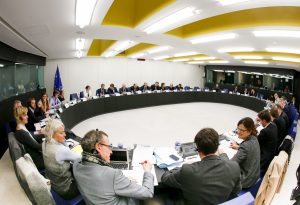In the landmark De Capitani case delivered on Thursday 22 March, the EU’s General Court requires the European Parliament to publish legislative negotiation documents (known by EU insiders as the “trilogue four-column document”) not only fully, but also immediately.

Case T-540/15 was brought by Emilio de Capitani, who had been refused access to the full negotiation document in ongoing legislative processes in the area of justice and home affairs.
Against the Parliament’s assertion that access to the full document could not be granted while negotiations were under way without jeopardising the legislative process, the Court found that no legal grounds existed in the access to documents act (Regulation 1049/01) to postpone disclosure of the document, as the act states should be the legal default position.
The so-called four-column document is used in closed-setting relay negotiations between small delegations of representatives from the EU’s two legislative branches, the European Parliament and the Council – so-called trilogues. It contains four columns reflecting variations of the draft legislative text, including the original proposal circulated by the Commission, the Council’s and the European Parliament initial, internally adopted positions,and finally the tentative compromise position (the fourth column).
The European Parliament had initially disclosed the requested documents as the court proceedings were under way, arguing that this removed the applicant’s interest in the proceedings and removed his standing in front of the General Court. The Court however disagreed, holding that as an applicant insisting on his right to gain full access at the time of ongoing proceedings, the fact that the document was subsequently disclosed did not remove his interest in clarifying whether the initial access refusal had been legal.
The Council and Commission, which both intervened in the case on the side of the European Parliament, furthermore argued that the fourth column of trilogue documents should for the duration of legislative negotiations be considered to come under a general presumption of non-disclosure, a term to describe a doctrine previously developed by the Court to exempt certain categories of documents from the duty of disclosure, placing the burden of proof for a public interest in disclosure on the applicant. The Court however did not go along with this argument and did not create a new general presumption for this category of documents.
Trilogues are today extremely prevalent in EU law-making, being applied in the vast majority of cases. According to a recent academic article, under the last (7th) parliamentary legislature, over 1,500 trilogues were held in in the context of around 350 legislative dossiers, leading to the early adoption of 85 per cent of all adopted laws in this period.
Mr De Capitani is a former member of the European Parliament’s Civil Rights Committee (LIBE) secretarial staff and a long-standing activist for greater transparency in EU decision making. In recent years he has particularly focssed his advocacy on the further opening up of trilogue negotiations. His case was decided about two and a half years after in was brough in September 2015. The European Parliament is expected to appeal the General Court’s decision with the Court of Justice, the EU’s highest court.

